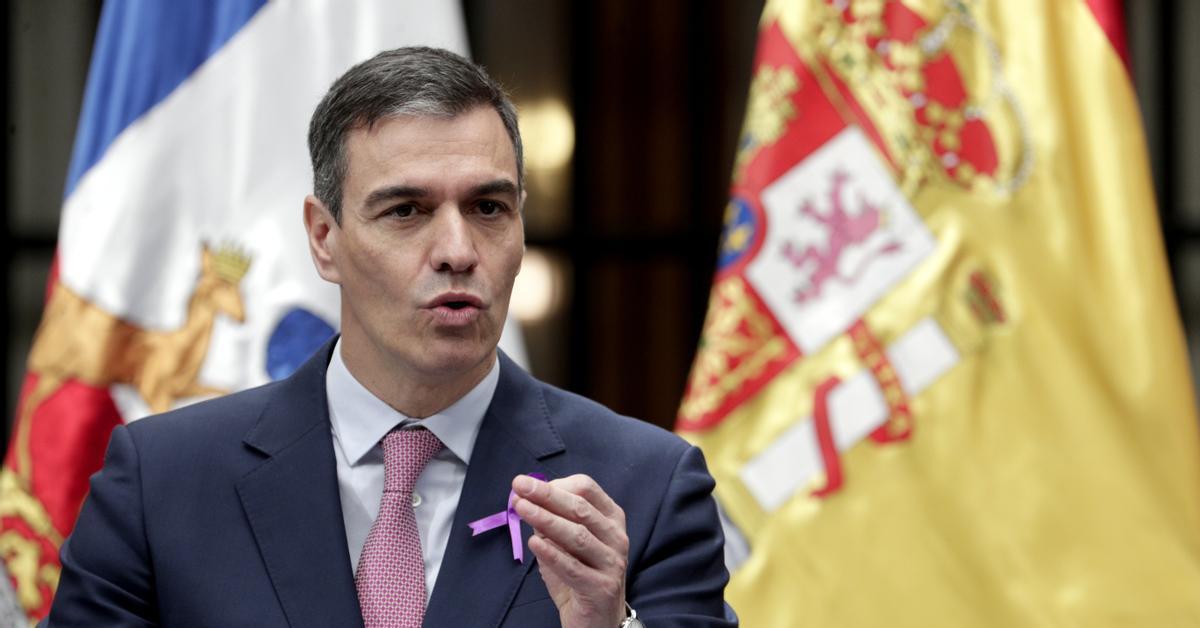
“Now that almost everything was done twenty years ago,” as Gil de Biedma said, the PSOE takes the opportunity to remember that the strategy of the right is not new, that it has always been the same, that it does not matter if Aznar, Rajoy, Casado or Feijóo were there. and that whenever a socialist holds the presidency of the Government, the opposition of the PP is just as tremendous and virulent.
“The problem is not the amnesty but Sánchez,” they say from the Moncloa in a week marked, with permission from the Koldo case, by the agreement between the PSOE and the independentists to approve the amnesty law. “If Zapatero even criticized the UME,” the Military Emergency Unit whose work today vindicates the entire parliamentary arc, “how are they going to not question this?” they ask.
And from this conviction, the Government is preparing in the coming days, on the occasion of the 20th anniversary of Zapatero’s first electoral victory, to vindicate what was done by the socialist governments since then until the agreement reached for the criminal oblivion of those involved in the independence process. The amnesty has gone from being a problem to a solution for a Government that, since the Galician elections, has not been going through its best moment.
The President of the Government sticks out his chest because he believes that the approval of the law will allow the legislature to reach its conclusion, despite the fact that the opposition – those inside and outside Parliament – trusts that the Government will fall sooner rather than later. “Let them lose all hope,” they respond in Moncloa, where after saving the trance of criminal oblivion that their parliamentary partners demanded to maintain support, they believe that “there will be a long mandate.”
“I know that they are going to be very long for some, but that is democracy,” Sánchez himself mocked this Friday, who was also convinced that he will manage to approve the Budgets for 2024, 2025 and 2026. The socialists , who are very prone to going from depression to euphoria with hardly any transition, do not hide the impetus that the amnesty pact has provoked in them and talk about stability, ignoring the shocks and twists of the script to which politics has accustomed us . And hence the strategy now is to go on the offensive and overcome the decline into which the Koldo case plunged them a week ago and the refusal of former Transport Minister José Luis Ábalos to hand over his deputy certificate.
The main architect of the legal microsurgery that has made the agreement with Junts and ERC possible has been the Minister of Justice, Félix Bolaños, who asks to evaluate the norm with the perspective of time to see its benefits because, in his opinion, it is not about not only of criminal oblivion for those involved in the independence process, but of reconciliation and coexistence with Catalonia, something that will be seen over time. In other words: the objective is to turn the page on one of the most traumatic issues in recent history and for the independence movement to return to pragmatism and institutional politics. “Little is remembered that Junts has signed a statement of reasons in which it assumes the Constitution and the Rule of Law,” adds a socialist leader.
Bolaños, like the rest of the Government, would like to talk more about scholarships, salaries, pensions and public health because he understands that the explanation of the law that has made Sánchez’s investiture possible “is complex”, although he adds immediately that It is also “impeccable according to all European standards.” And to justify his arguments, he relies on the latest report from the Venice Commission, which defends that “the separation of powers is not at risk because the judges will always have the last word, and that the principle of equality between Spaniards is not “is affected because the purpose of the law is reconciliation.”
Proof that the advisory body of the European Commission has weakened the hyperbolic opposition of the PP against the norm is that the right this week is no longer talking about the demolition of the rule of law or the end of democracy, but is now trying to associate amnesty with corruption and refers to “a corrupt transaction” in reference to the seven Junts votes necessary for Sánchez’s investiture. Neither the Government nor Junts could ever imagine that a report requested by the popular majority of the Senate from the advisory body of the Council of Europe on constitutional matters would turn against Feijóo and, furthermore, would serve as a landing pad for the agreement between socialists and independentists.
Of course, in the PP’s plot twist, it will also have had something to do with the fact that during the Galician election campaign the Spaniards learned from Feijóo himself that he himself studied for 24 hours the possibility of granting an amnesty, which would have approved new pardons. had he reached the Presidency and, although he did not publicly acknowledge this, he would also have modulated the political and judicial offensive against the independence movement. It is already known that the right, rather than a law, was always in favor of fixing things through the back door, as Senator Ignacio Cosidó certified in 2018 in that famous WhatsApp message in which he stated that the principle of pact for renewal of the General Council of the Judiciary, with Manuel Marchena as president of the judicial leadership, was going to assure the PP control “behind” the Second Chamber of the Supreme Court. Well that.
Feijóo or how to click on bone in Europe
The socialists understand, in any case, that this week the Government of Pedro Sánchez regains oxygen after the agreement with the independentists and that the PP has been left alone in Europe with its inflamed verb. In fact, Ursula Von der Leyen, whose relationship with Sánchez is unbeatable, has avoided making the slightest direct or indirect allusion to the amnesty this week during the European Popular Congress in Bucharest, contrary to what the Spanish conservatives intended. . And she, on the contrary, has firmly condemned the policies of the extreme right with which the PP governs in Spain in more than 100 town councils and several autonomous communities.
So, every time Feijóo travels to Europe to preach against Spain, whether for the management of European funds or for amnesty, he hits a nerve. Hence, he now trusts that it is the judges who can stop the application of the rule, something that the socialists do not contemplate as they have “limited the margin of interpretation” in the law. What the Government takes for granted is the presentation of a preliminary ruling before the CJEU that delays the initially planned deadlines and could extend the application up to a year and a half, according to La Moncloa’s calculations.
This is, however, an issue that escapes government control because “every law has a certain level of risk and room for interpretation, so it is impossible to guarantee 100% its application in the terms provided by the legislator,” they warn. in the PSOE.
It is increasingly evident that opposition to the law will jump to the judiciary after it leaves Congress. And that this is a battle that the Government has not been able to guarantee Junts will win, despite having limited the margin for interpretation and suppressing all reference to the Penal Code due to European standards.
Source: www.eldiario.es

